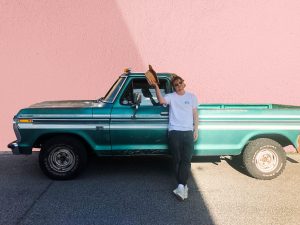
Ahead of the release of his debut solo album on October 16, Mav Karlo caught up with Audio Media International editor Daniel Gumble to talk going it alone for the first time, running his own record label and the importance of protecting the mental health of artists in an increasingly demanding industry…
Menno Versteeg, aka Mav Karlo, is about a month away from releasing his debut solo album Strangers Like Us when Audio Media International video calls him for a chat about the long road that has led to this defining moment in his career. He’s a busy man, speaking to us from the side of the road in his car, en route to a video shoot for an upcoming single. In addition to a hefty schedule of promo activities for the record, he also runs his own record label Royal Mountain Records, the Canadian home for the likes of Mac DeMarco, Alvvays, US Girls and Orville Peck. Like we said, he’s a busy man.
Not that you’d know it from the friendly, laid back character that greets us, his demeanour suggestive of someone with all the time in the world. There’s an almost childlike enthusiasm in his tone when talking about his work, underpinned by an evident wealth of experience garnered over a career spanning a decade and a half in the industry. It’s easy to see why people would not only want to work with him as an artist, but also as a label head.
Released on October 16, Strangers Like Us is an intimately personal record, infused with a troubadour spirit and coloured with a minimalist sonic paintbox. The mixture of stripped back guitars with splashes of synths and drum machines make for a sound that is both rich and breezy. Produced by Chris Coady (Amen Dunes, Beach House, Future Islands), the record presents a markedly different sound to the indie rock of Versteeg’s band for nearly 15 years, Hollerado. So, what prompted the decision to go it alone?
“We had been around for a long time and wanted to make one more album before stopping – we didn’t want to be one of those bands that makes seven or eight albums that no one gives a shit about,” he explains. “As we were making it there were new songs I had that didn’t quite fit, and I didn’t want our last album to be this completely different thing. I ended up with an album’s worth of demos, so I sent them to some of my favourite producers just to see who might be interested and right away Chris got back to me saying he thought it was awesome.”
Though very much a solo record, Versteeg called upon the services of his old Hollerado bandmate Nixon Boyd to assist with the demoing process before entering the studio with Coady.
“My main partner in crime in my old band, Nixon Boyd, is a producer in his own right and is an up-and-comer in the Canadian production scene,” Versteeg continues. “We demoed them together and they sounded good already, so we ended up keeping some of those magic takes where you just get it on the first go. He has an additional production credit on the record because we used quite a few of his things.”
As for what it was like working with Coady in the studio, Versteeg beams when recalling the experience.
“It was amazing, unlike any experience I’ve had,” he says. “We became really close buds. Since working with him I’ve sent three Royal Mountain Records bands to work with him. He has a crazy encyclopaedic knowledge of gear and sounds and I’m kind of the opposite. I know the sounds I want and I love experimenting with sounds, but usually I would have to describe it. Then Chris’s eyes would just go dead, like Data from Star Trek,” he laughs, “and then he’d spring into life and start sifting through all his gear. And if he doesn’t have what we need he’ll call someone up who does. He always managed to get exactly what I was looking for.
“One of the other things I really like about working with him is that sometimes he would just leave me on my own to play around with all of this gear in studio. And other times he would be like, right, get the fuck out of here for a couple of hours, while he was working on stuff and then we’d come back and the song would be in a whole new place. It was so exciting.”
Throughout his career, Versteeg has seen and experienced all manner of different working processes in the studio. As such, he has come to understand the type of producer that best fits his approach.
“Some bands just want a producer to do what they’re told,” he says. “And some want producers to completely take charge. I really like a balance. The creative juices for me ebb and flow, I love taking inspiration from someone who runs with an idea. I think that’s super cool, allowing someone to run with an idea and it goes in a completely different direction.
“I’m a 90 per cent vibe person,” he continues. “I have a very clear idea of how I want the record to feel. I know it sounds super hippy, but the feeling and the swagger and the way I want it to move and flow, I have a very clear idea of that feeling. That can sometime be hard to communicate with regards to how it actually sounds. I love working with Nixon for that reason, because he’s like a translator for me. He can make a feeling became a reality. And it often has to do with not just the gear and the sounds, but how it’s played. I’m a big fan of dynamics and I really do rely on good producers to turn that feeling into a sound.”
While moments on the record were born out of Versteeg’s demo sessions with Boyd, the bulk of the record was made between two iconic US studios – LA’s Sunset Sound and Sonic Ranch in Texas. As a self-professed ‘vibe person’, he could hardly have picked two more fitting locations.

“After we made the demos at Nixon’s studio, which is called Banquet Sound, near Toronto, we went to Sunset Sound, which was phenomenal,” he recalls enthusiastically. “We had access to like, the mic that the original Mary Poppins was recorded on, and I had a real moment with a mic that Frank Sinatra had used. It was amazing. But sometimes we’d use some radio shack mic that Chris had bought at a pawn shop, and that would go head-to-head against some $28,000 mic from the ‘60s that Sinatra recorded ‘My Way’ on. I find it really inspiring, just knowing the history of place like that. It makes you want to earn your place. It’s not enough just to use Frank Sinatra’s mic – that’s not going to make you Frank Sinatra. It makes you want to put your own stamp on things and contribute your own story to that place.
“After Sunset we went to Sonic Ranch,” he continues. “It’s about 300 yards from the Mexican border and it has a really cool history. It was an old pecan farm that has been turned into an incredible studio. It has great gear and the guy who owns it (Tony Rancich) is really cool and a huge fan of Chris’s. Chris did Beach House and Yeah Yeah Yeahs records there and because of that helped put it on the map, so we got the royal treatment there. It was an amazing experience.”
Outside of his new career as a solo artist, Versteeg’s time is spent running Royal Mountain Records. Artists on the label benefit not only from the knowledge and experiences he has picked up through the years, but also from a deeply held commitment to protecting the mental health and wellbeing of his roster. Having spent the best part of two decades as a touring artist, he has experienced first-hand the punishing schedules of life on the road and the hazardous trappings that travel in tandem.
“One of the things that came out of being an artist and spending 20 years on the road is seeing the toll it takes on band members,” he sighs. “The working conditions for bands can be very tough, especially if you are an up-and-coming touring band. Once you have some success and you have a tour bus things can change – although that has its own set of problems – but if you put four people in a van together, cross country, six month of the year, in close quarters, all kinds of broke, away from friends and family… And there are incredible highs and lows. You mix that with being in front of people who want to party and hang out with you every night, surrounded by drugs and alcohol… it’s a powder keg.
“I’ve had a lot of friends who have been lost, or almost lost, to it and it can’t continue. I use an analogy of when my grandfather started working at a concrete pipe factory in the ‘50s. They handed him a pair of steel-toe boots and some safety goggles because he was going to be working around concrete pipes. So, I’m like, if we’re going to send bands out on the road to make money for a label, there has to be some tools for them to protect themselves. I’m not saying, don’t do drugs or don’t stay up late, but if you need help, here is some money, and we have resources for you to see a therapist or take some medication. There have been bands who have used it to go to the dentist when they have had a bad tooth that they couldn’t fix. Just little things like that that can make their lives a little better.”
Versteeg’s efforts to ensure that the wellbeing of Royal Mountain Records artists is well maintained are equalled by his determination to foster an environment that prioritises creativity above all else. It was, he says, one of the main reasons he decided to launch a label in the first place.
“I’d been in some bad record deals in the early days and wanted to have the means of production in my own hands and not have to rely on anybody,” he says. “Running the label is a two different hats scenario, but I try to wear my artist hat as much as possible and to always think about what I would want as an artist, from the record deal to good communication and support. Then I hire great people to work on the label stuff. In the early days I tried to do everything myself, like the accounting, which was fucking crazy! I shouldn’t go near that! So you hire people you trust and know are good at that stuff. We are there to help the artists realise their vision, and sometimes labels forget that and end up telling the artist how they are going to make money.
“For better or worse, making money is truly secondary for the label. I want to make great art I want all the artist to be proud of what they’re making,” he concludes. “And so, far so good.”
Interview mav karlo menno versteeg Recording royal mountain records strangers like us Studio




